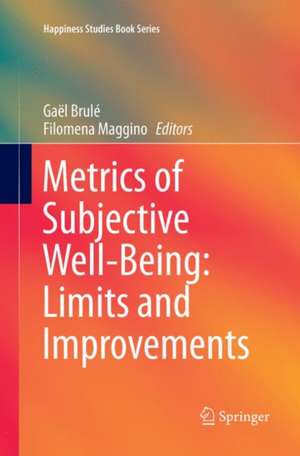Metrics of Subjective Well-Being: Limits and Improvements: Happiness Studies Book Series
Editat de Gaël Brulé, Filomena Magginoen Limba Engleză Paperback – 7 aug 2018
| Toate formatele și edițiile | Preț | Express |
|---|---|---|
| Paperback (1) | 599.84 lei 38-44 zile | |
| Springer International Publishing – 7 aug 2018 | 599.84 lei 38-44 zile | |
| Hardback (1) | 910.82 lei 6-8 săpt. | |
| Springer International Publishing – 9 aug 2017 | 910.82 lei 6-8 săpt. |
Preț: 599.84 lei
Preț vechi: 631.42 lei
-5% Nou
Puncte Express: 900
Preț estimativ în valută:
114.78€ • 120.16$ • 94.97£
114.78€ • 120.16$ • 94.97£
Carte tipărită la comandă
Livrare economică 01-07 aprilie
Preluare comenzi: 021 569.72.76
Specificații
ISBN-13: 9783319871691
ISBN-10: 3319871692
Pagini: 264
Ilustrații: X, 264 p. 30 illus., 15 illus. in color.
Dimensiuni: 155 x 235 mm
Ediția:Softcover reprint of the original 1st ed. 2017
Editura: Springer International Publishing
Colecția Springer
Seria Happiness Studies Book Series
Locul publicării:Cham, Switzerland
ISBN-10: 3319871692
Pagini: 264
Ilustrații: X, 264 p. 30 illus., 15 illus. in color.
Dimensiuni: 155 x 235 mm
Ediția:Softcover reprint of the original 1st ed. 2017
Editura: Springer International Publishing
Colecția Springer
Seria Happiness Studies Book Series
Locul publicării:Cham, Switzerland
Cuprins
Chapter 1. Towards more complexity in subjective well-being studies; Gaël Brulé and Filomena Maggino.- Part I. Conceptual Issues.- Chapter 2. Can Good Life Be Measured? The dimensions and measurability of a life worth living; Frank Martela.- Chapter 3. The Subjective Object of Well-Being Studies. Well-being as the experience of being well; Mariano Rojas.- Part II.- Measurement issues.- Chapter 4. Measures of Happiness: Which to choose?; Ruut Veenhoven.- Chapter 5. Explaining the decline in subjective well-being over time in panel data; Katia Iglesias, Pascale Gazareth and Christian Suter.- Chapter 6. Reducing current limitations in order to enhance the quality of subjective well-being research: the example of mindfulness; Rebecca Shankland, Ilios Kotsou, Caroline Cuny, Lionel Strub, and Nicholas J. L. Brown.- Chapter 7. Measuring indecision in happiness studies; Stefania Capecchi.- Part III.- Comparability issues.- Chapter 8. Evaluating comparabi
lity of survey data on subjective wellbeing data; Inga Kristoffersen.- Chapter 9. Label scale and rating scale in subjective well-being measurement; Ester Macri.- Part IV.- Possible improvements of the measurability of subjective well-being.- Chapter 10. Culture and Well Being: A Research Agenda Designed to Improve Cross-Cultural Research Involving the Life Satisfaction Construct; Dong-Jin Lee, Grace B. Yu and Joseph Sirgy.- Chapter 11. A Reconsideration of the Easterlin Happiness-Income Paradox; Kenneth Land, Vicki Lamb & Xiaolu Zang.- Chapter 12. Methods to Increase the Comparability in Cross-National Surveys, Highlight on the Scale Interval Method and the Reference Distribution Method; Tineke de Jonge.Notă biografică
Gaël Brulé(PhD) is a post-doc researcher in happiness studies at Erasmus University of Rotterdam. His areas of expertise are cross-national and cross-cultural comparison and comparability of happiness.
Filomena Maggino is professor of Social Statistics at the University of Florence (Italy) and chief of the Laboratory of Statistics for Research in Social and Educational field. In the field of statistics applied to social research, her twenty-year research covers mainly data (i) production (with particular reference to subjective data assessment), (ii) analysis (with particular reference to multivariate analysis, scaling models and composite indicator construction), and presentation and dissemination (with particular reference to defining a model aimed at assessing the quality of communication in statistics). Her research interests aim at seeing these topics in the perspective of quality of life assessment.
Textul de pe ultima copertă
This volume analyses the quantification of the effect of factors measuring subjective well-being, and in particular on the metrics applied. With happiness studies flourishing over the last decades, both in number of publications as well as in their exposure, researchers working in this field are aware of potential weaknesses and pitfalls of these metrics. Contributors to this volume reflect on different factors influencing quantification, such as scale size, wording, language, biases, and cultural comparability in order to raise awareness on the tools and on their conditions of use.
Caracteristici
Analyses the quantification of the effect of factors measuring subjective well-being Shows how the application of correct metrics can make studies less vulnerable Reflects on different factors influencing quantification Includes supplementary material: sn.pub/extras




